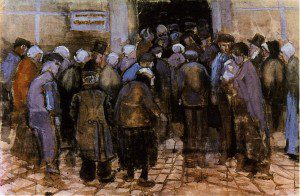
It’s not uncommon, when you’re someone interested in “social justice,” to have this pericope thrown at you:
Now when Jesus was in Bethany in the house of Simon the leper, a woman came up to him with an alabaster jar of costly perfumed oil, and poured it on his head while he was reclining at table. When the disciples saw this, they were indignant and said, “Why this waste? It could have been sold for much, and the money given to the poor.” Since Jesus knew this, he said to them, “Why do you make trouble for the woman? She has done a good thing for me. The poor you will always have with you; but you will not always have me. In pouring this perfumed oil upon my body, she did it to prepare me for burial. Amen, I say to you, wherever this gospel is proclaimed in the whole world, what she has done will be spoken of, in memory of her.” (Matthew 26:6-13)
The argument moves beyond the passage, but takes it as its basis. In sum it goes something like this: why use the state or some other non-private means to help the poor, when the risks associated with state (or insert bugbear here) assistance are great, especially when the poor will always be with us anyway? You’re fighting a problem you can’t solve.
Let’s forget all the typical objections to this argument for a second. Forget the bit in Mark implying that indeed the point has more to do with valuing faith in Christ than it does with helping the poor (which we should be doing however we can): “The poor you will always have with you, and whenever you wish you can do good to them, but you will not always have me” (Mark 14:7). Forget that the passage has to do with prefiguring Christ’s death and resurrection (the next verses, in both Mark and Matthew deal with Judas going to the chief priests). Forget that not the state, nor community, nor anything approaching the how of love for the poor enters in here.
I have some simple questions: what bad thing are we not stuck with unto the end? Is there anything that comes prior to faith in Christ (again, faith in Him would seem to be the center of the passage)? What problem can we actually solve in its entirety?
For example, we can make abortion illegal, but will making it illegal mean that its existence will pass away from the earth (all pro-life people are, I suspect, familiar with the “do you want us to return to back-alley abortions?” argument)? Will working for just wars ensure that no unjust wars will ever be fought? Will standing up for the migrant with legal action guarantee that no migrant will ever face discrimination or obstinacy?
The fact that something cannot be eliminated is no excuse on a Christian understanding. Take the famous messianic prophecy from Isaiah:
Then the wolf shall be a guest of the lamb,
and the leopard shall lie down with the young goat;
The calf and the young lion shall browse together,
with a little child to guide them.
The cow and the bear shall graze,
together their young shall lie down;
the lion shall eat hay like the ox.
The baby shall play by the viper’s den,
and the child lay his hand on the adder’s lair.
They shall not harm or destroy on all my holy mountain;
for the earth shall be filled with knowledge of the LORD,
as water covers the sea. (Isaiah 11:6-9)
Perfect justice is of the kingdom, and yet we still pray “Thy kingdom come; Thy will be done on earth as it is in Heaven.” In other words, the continued existence of an evil is not a reason to accept its existence as such. It may never pass away under our power, but we still have a duty, a need, a desire, to fight tooth and nail against the degradation of our fellow human beings. Yes the poor will always be with us! But we will learn from them in their lowliness and humility by being with them and loving them, by lifting them up as best we can and with whatever valid means we have. They are a reminder of the Kingdom, not a defense to be trotted out against one’s chosen politico-philosophical adversaries.
Some will say that this does not legitimate using the state as a means to help the poor. Fine. In fact, as an admirer of Dorothy Day, I think that question is beside the point. What I do know is that any Scriptural exegesis that trots the poor out for our self-aggrandizement, for a “gotcha” in the face of Christian charity is, at best wrongheaded, at worst an excuse to be numbered among the goats.













